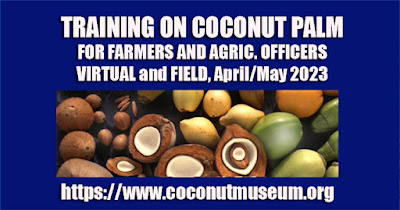We participate and/or organize trainings, lectures and workshops. We can also provide our expertise for the creation of new Coconut Ecomuseums!
Nous participons ou organisons des conférences, des formations ou des ateliers sur tous les sujets concernant le cocotier. Nous pouvons aussi apporter notre expertise pour la création de nouveaux écomusées du cocotier!
Contact: Roland_bourdeix@yahoo.fr
Some presentations prepared for trainings and meetings (click to see the videos)
2023, April. In situ coconut conservation. A virtual and physical workshop for Pacific region farmers & agricultural officers. 24/25 April (virtual); 2-4 May (PNG); 10-12 May (Fiji). SPC, Land Resources Division. See details about this training and register here. |
Virtual Workshop lectures
01. Bourdeix, R. (2023). The COGENT Global Strategy & Coconut Germplasm Catalogues. Virtual workshop. Day 1, Section 1.1, 08h10-08h20, 10-minute presentation (voir le texte français).
02. Bourdeix, R. (2023). Coconut diversity, phenotypic versus genetic, ex situ versus in situ. Virtual workshop. Day 1, Section 2.2, 08h40-08h55, 15-minute presentation (voir le texte français).
02. Bourdeix, R. (2023). Coconut diversity, phenotypic versus genetic, ex situ versus in situ. Virtual workshop. Day 1, Section 2.2, 08h40-08h55, 15-minute presentation (voir le texte français).
03. Bourdeix, R. (2023). Rapid characterization in farmer’s field during a survey. - What to look for, to measure and to picture.Virtual workshop. Day 1, Section 3.2, 10h10-10h20, 10-minute presentation (voir le texte français).
04. Bourdeix, R. (2023). Current status of ex situ and in situ coconut conservation. Virtual workshop. Day 1, 10h30-10h45, Section 4.1, 15-minute presentation (voir le texte français).
05. Bourdeix, R. (2023). Tall-type, Dwarfs and Compact Dwarfs, and intermediate forms. Virtual workshop. Day 2, Section 5.1, 08h10-08h15, 6-minute presentation (voir le texte français).
06. Bourdeix, R. (2023). Coconut hybrids what are they? Virtual workshop. Day 2, Section 5.2, 08h15-08h20, 5-minute presentation (voir le texte français).
07. Bourdeix, R. (2023). Coconut reproductive biology and how to use it to maintain or create varieties. Virtual workshop. Day 2, Section 6.1, 08h40-08h55, 15-minute presentation. (voir le texte français)
08. Bourdeix, R. (2023). Selecting the best parent palms. Virtual workshop. Day 2, Section 7.3, 09h50-10h00, 10-minute presentation (voir le texte français).
09. Bourdeix, R. (2023). PolyMotu and other planting designs for both seed production and conservation of varieties. Virtual workshop. Day 2, Section 7.4, 10h00-10h15, 15-minute presentation (voir le texte français).
10. Bourdeix, R. (2023). How do growers select and conserve varieties? Virtual workshop. Day 2, Section 8.2, 10h55-11h05, 10-minute presentation (voir le texte français).
11. Bourdeix, R. (2023). Public and other areas available for in-situ conservation. Virtual workshop. Day 2, Section 8.4, 11h15-130, 15-minute presentation (voir le texte français).
Field training lectures
Field Day 1:
12. Bourdeix, R. (2023). Coconut varieties: How to identify and name them? Field workshop. Day 1, Section 1.2, 08h50-09h00, 10-minute presentation (voir le texte français).
13. Bourdeix, R. (2023). Coconut reproductive biology and how to use it to maintain or create varieties. Field workshop. Day 1, Section 1.3, 09h50-09h10, 20-minute presentation (voir le texte français).
14. Bourdeix, R. (2023). Catalogues of varieties and their importance for seednuts dissemination and business. Field workshop. Day 1, Section 3.1, 14h30-15h00, 30-minute presentation (voir le texte français).
Field Day 2:
15. Bourdeix, R. (2023). Genetic markers in the nursery. Field workshop. Day 2, Section 3.1, 09h00-09h10, 10-minute presentation (voir le texte français).
16. Bourdeix, R. (2023). Planting designs for commercial plantation, conservation and seednuts production (including movies). Field workshop. Day 2, Section 6.1, 15h00-16h00, 60-minute presentation (voir le texte français).
Field Day 3:
17. Bourdeix, R. (2023). How do growers select? criteria and methods. Field workshop. Day 3, Section 4.1, 14h00-14h10, 10-minute presentation (voir le texte français).
18. Bourdeix, R. (2023). PolyMotu and other in situ design for conservation and seed production. Field workshop. Day 3, Section 4.2, 14h15-14h30, 15-minute presentation (voir le texte français).
19. Bourdeix, R. (2023). Linking conservation and on farm ecotourism (Coconut museums). Field workshop. Day 3, Section 4.4, 14h40-14h50, 10-minute presentation (voir le texte français).
2023, March. Meeting with the Global Trust. ITAG1 - International Thematic Action Group on ex situ & in situ coconut conservation. International Coconut Genetic Resources Network, Jakarta, Indonesia. |
Bourdeix, R. (2023) Main recommendations about coconut ex situ conservation from the COGENT Global Strategy. Six-minute presentation. |
Examples of events to which we have contributed.






